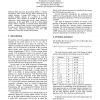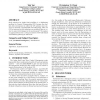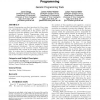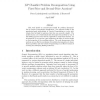103
click to vote
EH
2004
IEEE
15 years 6 months ago
2004
IEEE
Multi Expression Programming (MEP) is a Genetic Programming (GP) variant that uses linear chromosomes for solution encoding. A unique MEP feature is its ability of encoding multipl...
107
click to vote
EH
2004
IEEE
15 years 6 months ago
2004
IEEE
This paper reviews the use of genetic programming as an automated invention machine for the synthesis of both the topology and sizing of analog electrical circuits. The paper focu...
117
click to vote
GECCO
2009
Springer
15 years 6 months ago
2009
Springer
Since the genomics revolution, bioinformatics has never been so popular. Many researchers have investigated with great success the use of evolutionary computation in bioinformatic...
135
Voted
GECCO
2007
Springer
15 years 6 months ago
2007
Springer
This paper introduces a function that increases the amount of neutrality (inactive code in Genetic Programming) for the Artificial Ant Problem. The objective of this approach is t...
131
Voted
GECCO
2007
Springer
15 years 6 months ago
2007
Springer
The multi domain nature of a mechatronic system makes it difficult to model using a single modeling technique over the whole system as varying sets of system variables are require...
GECCO
2007
Springer
15 years 6 months ago
2007
Springer
Stock selection for hedge fund portfolios is a challenging problem for Genetic Programming (GP) because the markets (the environment in which the GP solution must survive) are dyn...
117
click to vote
GECCO
2007
Springer
15 years 6 months ago
2007
Springer
While support vector machines (SVMs) have shown great promise in supervised classification problems, researchers have had to rely on expert domain knowledge when choosing the SVM&...
133
click to vote
GECCO
2007
Springer
15 years 6 months ago
2007
Springer
Genetic Programming was first introduced by Koza using tree representation together with a crossover technique in which random sub-branches of the parents' trees are swapped ...
145
click to vote
EUROGP
2007
Springer
15 years 6 months ago
2007
Springer
This work details an auction-based model for problem decomposition in Genetic Programming classification. The approach builds on the population-based methodology of Genetic Progra...
139
click to vote
GECCO
2010
Springer
15 years 6 months ago
2010
Springer
This paper presents a new form of Genetic Programming called Cartesian Genetic Programming in which a program is represented as an indexed graph. The graph is encoded in the form o...




